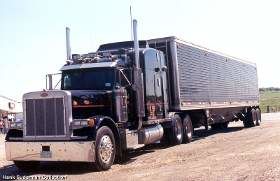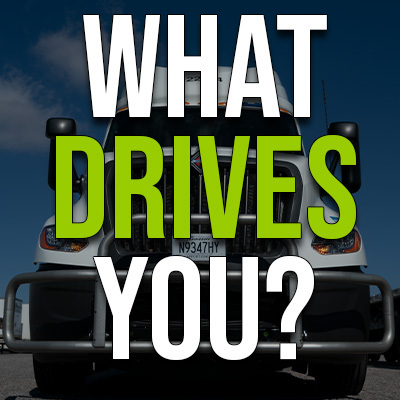New Guy Questions
Topic 28367 | Page 3
Mike, you went to the driving school and obtained your CDL. You stated in an earlier post that you haven't ever coupled/uncoupled trailers. Did you not learn this at the driving school you went to? That is a basic skill taught and learned early in any program; at least, it was where I went. In my limited experience, I have never heard of a school not teaching those skills. Maybe I misinterpreted you post, or missed a clarification.
Also, what company is going to take a driver who just finished school and no experience, and put them out solo without any further training with a trainer? That is unfathomable, not to mention extremely dangerous. The liability would be through the roof.
CDL:
Commercial Driver's License (CDL)
A CDL is required to drive any of the following vehicles:
- Any combination of vehicles with a gross combined weight rating (GCWR) of 26,001 or more pounds, providing the gross vehicle weight rating (GVWR) of the vehicle being towed is in excess of 10,000 pounds.
- Any single vehicle with a GVWR of 26,001 or more pounds, or any such vehicle towing another not in excess of 10,000 pounds.
- Any vehicle, regardless of size, designed to transport 16 or more persons, including the driver.
- Any vehicle required by federal regulations to be placarded while transporting hazardous materials.
HOS:
Hours Of Service
HOS refers to the logbook hours of service regulations.Well, we didn't receive any instruction on coupling/uncoupling, nor tandems adjustment when I went to my CDL school, either.
CDL:
Commercial Driver's License (CDL)
A CDL is required to drive any of the following vehicles:
- Any combination of vehicles with a gross combined weight rating (GCWR) of 26,001 or more pounds, providing the gross vehicle weight rating (GVWR) of the vehicle being towed is in excess of 10,000 pounds.
- Any single vehicle with a GVWR of 26,001 or more pounds, or any such vehicle towing another not in excess of 10,000 pounds.
- Any vehicle, regardless of size, designed to transport 16 or more persons, including the driver.
- Any vehicle required by federal regulations to be placarded while transporting hazardous materials.
Tandems:
Tandem Axles
A set of axles spaced close together, legally defined as more than 40 and less than 96 inches apart by the USDOT. Drivers tend to refer to the tandem axles on their trailer as just "tandems". You might hear a driver say, "I'm 400 pounds overweight on my tandems", referring to his trailer tandems, not his tractor tandems. Tractor tandems are generally just referred to as "drives" which is short for "drive axles".
Tandem:
Tandem Axles
A set of axles spaced close together, legally defined as more than 40 and less than 96 inches apart by the USDOT. Drivers tend to refer to the tandem axles on their trailer as just "tandems". You might hear a driver say, "I'm 400 pounds overweight on my tandems", referring to his trailer tandems, not his tractor tandems. Tractor tandems are generally just referred to as "drives" which is short for "drive axles".
Got a little bit of couple uncouple, the front of the trailer should be about 1/2 to 2/3 of the up the plate to prevent damage to dolly legs if it wasnt a perfect hook was our training. Actual time doing it was probably 25 min (6 or so cycles) in the yard.
5th wheel plate condition was part of our tractor pretrip inspection protocols, had to have it committed to memory with all the rest of the steps...
And what school did you go to?
Well, we didn't receive any instruction on coupling/uncoupling, nor tandems adjustment when I went to my CDL school, either.
CDL:
Commercial Driver's License (CDL)
A CDL is required to drive any of the following vehicles:
- Any combination of vehicles with a gross combined weight rating (GCWR) of 26,001 or more pounds, providing the gross vehicle weight rating (GVWR) of the vehicle being towed is in excess of 10,000 pounds.
- Any single vehicle with a GVWR of 26,001 or more pounds, or any such vehicle towing another not in excess of 10,000 pounds.
- Any vehicle, regardless of size, designed to transport 16 or more persons, including the driver.
- Any vehicle required by federal regulations to be placarded while transporting hazardous materials.
Tandems:
Tandem Axles
A set of axles spaced close together, legally defined as more than 40 and less than 96 inches apart by the USDOT. Drivers tend to refer to the tandem axles on their trailer as just "tandems". You might hear a driver say, "I'm 400 pounds overweight on my tandems", referring to his trailer tandems, not his tractor tandems. Tractor tandems are generally just referred to as "drives" which is short for "drive axles".
Tandem:
Tandem Axles
A set of axles spaced close together, legally defined as more than 40 and less than 96 inches apart by the USDOT. Drivers tend to refer to the tandem axles on their trailer as just "tandems". You might hear a driver say, "I'm 400 pounds overweight on my tandems", referring to his trailer tandems, not his tractor tandems. Tractor tandems are generally just referred to as "drives" which is short for "drive axles".
Careers World Wide. It's a private school in Keensburg, CO, utilized by both CRST and Stevens.

Thanks everyone for the ongoing input. My laptop rolled boxcars, had to get a new one, and have been MIA a few days because of that.
Ok, I signed a "Voluntary Withdrawal" and left the maybe employment on Thursday. Tampa Driving School out of their Tenn. location is finding me employment. Because of the holiday I guess it'll be this week before they're able to do the calling. I am totally satisfied with Tampa Driving School.
Yes, it would sure appear that not providing any kind of "mentor", "OJT", "Traiiner" , (whatever label you wish) is not real common however not all that uncommon either. If I stayed aboard and passed the testing, I'd have a truck by tomorrow (Monday), maybe Tuesday. I'm 100% convinced that my choice to leave the company was the correct choice.
I'm in total agreement with the comments as to not a real good idea to be solo in a truck with maybe 100 miles or so under my belt. Also, there was to me a very complicated "lease" that I think I was supposed to enter into.
Don, At the school we had to learn all the coupling components and identify all of them. However, no, never actually coupled or uncoupled. First I coupled and uncoupled was at my brief "employment" and I believe that was last Wednesday
I made it very clear to two instructors, the lady that's HR, and to the guy in charge that I was very uncomfortable without a trainer and really didn't feel I was ready to solo. They made it clear that they once did offer trainers but discontinued that about a year or so ago. They made it clear that they did not offer trainers.
My choice to leave was the correct choice .
New Reply:
New! Check out our help videos for a better understanding of our forum features

















Preview:
This topic has the following tags:
TransAm CDL Training Changing Careers Choosing A Trucking Company Leasing A Truck Truck Driver Training









 TT On Facebook
TT On Facebook
Mike, trucking is learned by doing. You can't become a successful trucker by research, by reading a book, or by visiting forums. Trucking schools don't even produce truckers. They produce people who just barely have the credentials to obtain a CDL , which honestly, doesn't mean a whole lot about your ability to produce any effective results as a trucker. You obviously are aware of those things. And we appreciate your questions.
Any reputable trucking outfit is going to put the FNG with a trainer for awhile. There's just a ton of things you need some help with at the beginning. Heck, I'm still perfecting my game after 7 plus years out here. Your prospective employer's refusal to provide training is not just a huge red flag, but for me, it's a non-starter. I absolutely wouldn't do it. You will find yourself in some terrible situations with no basic understanding of how to deal with them.
You need at least four weeks with a trainer. I'd say make that your minimum acceptable level and start working from that requirement for your own satisfaction with the company. Sometimes trucking schools receive "finders fees" for placing there students with companies. Therefore I wouldn't rely on your school's advice. Start applying to major OTR companies. That's your most reliable option.
Roehl may possibly be a good place for you. They have excellent training, and they put their rookie drivers with a special dispatcher at first who is trained to provide them with some assistance as they ease into the career.
CDL:
Commercial Driver's License (CDL)
A CDL is required to drive any of the following vehicles:
OTR:
Over The Road
OTR driving normally means you'll be hauling freight to various customers throughout your company's hauling region. It often entails being gone from home for two to three weeks at a time.
Dispatcher:
Dispatcher, Fleet Manager, Driver Manager
The primary person a driver communicates with at his/her company. A dispatcher can play many roles, depending on the company's structure. Dispatchers may assign freight, file requests for home time, relay messages between the driver and management, inform customer service of any delays, change appointment times, and report information to the load planners.HOS:
Hours Of Service
HOS refers to the logbook hours of service regulations.EPU:
Electric Auxiliary Power Units
Electric APUs have started gaining acceptance. These electric APUs use battery packs instead of the diesel engine on traditional APUs as a source of power. The APU's battery pack is charged when the truck is in motion. When the truck is idle, the stored energy in the battery pack is then used to power an air conditioner, heater, and other devices